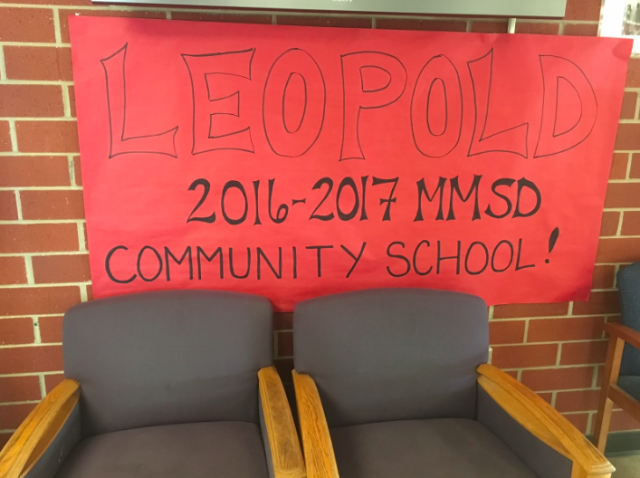






 Leopold’s transition to a community school will improve resources for students and their families. (Melissa Behling/Madison Commons)
Leopold’s transition to a community school will improve resources for students and their families. (Melissa Behling/Madison Commons)
After implementing a number of programs to address its academic achievement gaps, becoming a community school might be the breakthrough Leopold Elementary School needs.
Both Leopold and Mendota Elementary Schools have been named community schools. Starting in the 2016-2017 academic year, the schools will have the resources to provide health care, academic tutoring, mentoring, food access and parent leadership opportunities to students and their families.
“We recognize that through the children that come to school, we are a partnership with families,” Leopold Principal Karine Sloan said. “We are doing everything we possibly can to be able to meet the needs they might have, which, in return, only benefits the students back in the classroom and their ability to be successful.”
The Madison Metropolitan School district will use the Leopold and Mendota Elementary schools to test the community school model. Based on their experience, MMSD plans to expand the model to additional schools.
“Community schools have the potential to take our support for children and families in Madison to a new level. Many of our families still struggle with access to community services, but through this work, we’ll be able to integrate coordinated services into schools, where our students and families are every day,” Superintendent Jennifer Cheatham said in a statement. “When students and their families are fully supported, our students can be ready to excel in the classroom.”
This isn’t the first time Leopold has served as an example for MMSD in implementing programs to address the academic achievement gap. They’re also leading a pilot program to improve traditional parent-teacher conferences, implementing positive behavioral support programs and using data analysis to track achievement and individual goals for student growth.
The community schools model is one that is different from these past initiatives, according to Sloan, because “it’s the integration of services that makes the difference, as well as the expansion.”
Leopold is located in a resource desert, so there are few social services available to its students and families. This means they don’t have access to a nearby public library, grocery store, community center or recreation facility.
Leopold will decide which programs to implement next year after meeting with families to conduct a needs analysis.
Some options are to expand its open schoolhouse programming, like nutrition and cooking classes, open gym time and English classes for parents. Leopold could also become a recreation and neighborhood center, since the community doesn’t have one.
Sloan hopes Leopold will be able to continue programs that now can only be sustained for a short time. For example, the Celebrate Smilies program brought dentists into the school for six weeks to provide free care for students. Sloan also mentioned REAP Food Group, which has administered nutrition classes to students and helped implement a salad bar in the cafeteria.
Leopold received the community school grant after an application process through the Madison Metropolitan School district. They had to show staff readiness, a need for services and community support for the adoption of the new model. Community partners submitted a total of 17 letters of support for Leopold to receive the grant.
“What I hope this will mean for students and families is that Leopold becomes like a second home,” Sloan said. “For a lot of our students, it is, but that they really understand that we don’t just serve our students in an academic sense - we serve the whole child.”
|
|
|
Welcome to the Madison Commons, a website designed to provide news and information about all of Madison's neighborhoods and a crossroads for the discussion of community issues. The name comes from the idea of a village commons, a place for news, talk, debate, and some entertainment, too, that's open to everyone.
All rights reserved. Read more about the Madison Commons and its partners.

